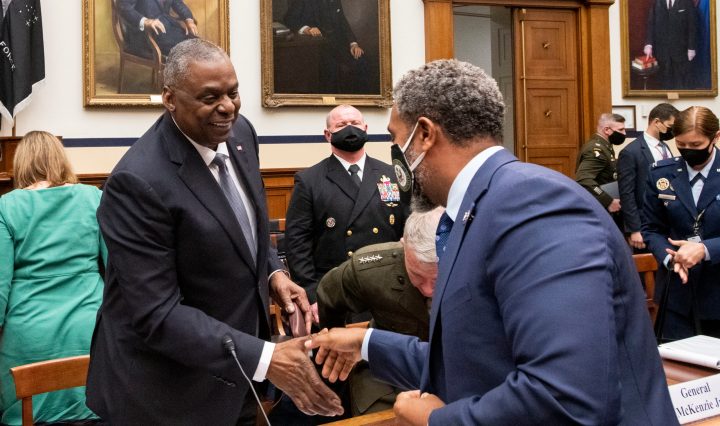DM168 GLOBAL VIEWS
US-Afghanistan misadventure: Why things went so horribly wrong

Congressional hearings show the mistakes on the final days of the US-Afghan strategic pullout.
First published in the Daily Maverick 168 weekly newspaper.
Two days of congressional testimony by the Pentagon’s senior leadership lay bare the mistakes of the US’s final days in Kabul, and gave Republicans opportunities to pin the disaster on Joe Biden.
It is easy to conjure up the movie version of the drama of a US congressional hearing. Senior officials give testimony and recoil from tough questions asked by stern-faced senators and representatives. Everyone in the ornate room is under the glare of the klieg lights, the television cameras are on, and the camera shutters click away.
More often, though, the people giving testimony read long, numbing statements. Those asking questions demand impossible-to-provide answers, and sometimes they betray how little they were paying attention to questions that may have been asked before their own.
So it was with the paired Senate and House of Representatives hearings in Washington on 28 and 29 September, coming at the end of the US engagement in Afghanistan.
The hearings are important for what they revealed (or obscured) on the US’s futility in Afghanistan, and are convenient to judge the failures there by three previous presidents and the incumbent. But for many members of Congress, the real action is a complex tangle of pending budgetary legislation, together with yet other crises.
Central to this are President Biden’s two keystone (and expensive) infrastructure plans (in part caught up in intra-Democratic Party squabbles), the passage of the federal budget or temporary continuing resolutions to keep the government running, and an increase in the federal debt ceiling. It will allow the Treasury to finance state spending that was previously incurred.
These come in addition to the continuing wound of the country’s seemingly intransigent immigration crisis, the persistence and consequences of the newest strains of the Covid-19 pandemic, and a presidential decision enforcing mandatory Covid-19 vaccinations for all federal employees and contractors. Despite past evidence to the contrary, members of Congress are now trying to prove their august body is actually capable of doing more than one thing at a time. However, the jury remains out over that question.
Over the two days of hearings, incumbent Secretary of Defense Lloyd Austin, Chairman of the Joint Chiefs of Staff General Mark Milley, the commander of Centcom (the US military’s central command responsible for all US forces on station in the Near East through to Afghanistan), and Marine General Kenneth McKenzie appeared as witnesses.
Prior to the hearings, there was speculation about how harshly Milley would be grilled for potentially embarrassing details about his telephone conversations with his Chinese counterpart. They discussed the possibility that then-president Donald Trump may provoke a military confrontation with China in the last days of his presidency.
He testified that US intelligence had picked up disquieting signs, and the Chinese were worried about this. Milley explained that the calls had been to reassure China’s military leadership that there would be no ad hoc, spontaneous military adventures directed at China. In response, Republican congressmen called for Milley’s resignation, but no sustained outbursts and apologies from many Democrats for such outbursts.
In response to the questioning and histrionics about those calls, Milley added that what he had done was well within the range of appropriate actions for someone in his position. It was normal to keep in contact with powerful counterparts to avoid misunderstandings. He had informed the then secretary of state, the president’s chief of staff and the acting secretary of defense about those calls. Multiple senior officials had been listening in on the conversations too. Republicans had tried to pin the most incendiary language in the recent books on the Trump administration on Milley, but his repeated mantra was that he simply hadn’t read the books.
The real fireworks came over Afghanistan. Republican senators and representatives were eager to assign total blame on Joe Biden. They conveniently ignored the first 19 years of the conflict and the previous mistakes that had carried the US deep down the rabbit hole of Afghanistan. One Republican senator even installed an enlarged copy of The Economist’s cover that bore the words: “Biden’s Debacle” behind him as a prop.
By contrast, Democrats attempted to lead the conversation to the mishaps of the preceding two decades, then to Donald Trump’s ill-conceived accord with the Taliban in February 2020 and the constraints that agreement placed upon his successor.
Republicans were eager to make Biden the only guilty party. He had withdrawn the remaining troops, didn’t keep a US presence at Bagram Airbase and caused the initial chaos at the evacuation airport. He also declined to follow the advice of his military commanders and delay the final evacuation, failed to identify every single remaining American (dual nationals – those who chose to stay with their local families, or those who stayed for any other reasons) and evacuate them, and his responsibility for the collapse of the Afghan government. By contrast, Democrats broadened the scope of the hearings, looking to the failures in vision, strategy and tactics over the long chronology of the intervention.
They defended the president’s role in following an agreement already in existence when he came into power, and his decision to draw-down despite military recommendations to keep a minimal force of military personnel in Afghanistan for longer. They attempted to elicit from witnesses an understanding that Afghanistan would collapse and that it would be futile to extend that government’s existence through a modest US military presence in the country.
It sometimes appeared as if the real adults in the room were the three witnesses. Yes, they sometimes struggled to respond to rhetorical harangues such as why the military had heartlessly abandoned any remaining Americans. Or why the military had been unable to predict accurately the fall of the Afghan government – largely because such questions have no pat responses.
In testimony, the witnesses argued the evacuation had been an enormous operational success, with over 124,000 people – including around 6,000 Americans – flown out. But, in truth, that evacuation had come at the end of larger strategic failure.
Looking back over two days of testimony, it was the voice of Washington Post columnist-at-large, Robin Givhan, that seemed to find the right texture. She wrote: “…After 20 years, it’s hard to know who to believe about why things went so terribly wrong in Afghanistan.
But as the top military leaders involved in this country’s withdrawal from that floundering country testified on Capitol Hill, the two men in uniforms adorned with ribbons and stars displayed a greater understanding of humility and America’s limitations than all the public servants in their sober suits.
There was no way to sum up what went wrong in the kind of quotable quip for which so many senators seemed to be fishing. But if there was one lesson learned that might well be etched on some memorial to the lost cause of Afghanistan, it might well be Milley’s summation: ‘Don’t Americanise the war.’
“Marine [General] Kenneth F McKenzie, commander of US Central Command, took responsibility for the drone strike that killed 10 civilians. [General] Mark A Milley, Chairman of the Joint Chiefs of Staff, noted that the withdrawal had been a logistical success and a strategic failure.
The military men had wanted to leave about 2,500 US troops on the ground. McKenzie and Milley had given President Biden their best advice.
“He ordered all troops out. And when a petulant [Senator] Tom Cotton [R-Ark] demanded to know why Milley didn’t resign in response, the general explained the exact nature of what it means to have a civilian in control of the military.
“It would be an incredible act of political defiance for a commissioned officer to just resign because my advice is not taken. … This country doesn’t want generals figuring out what orders we are going to accept and do or not. ‘That’s not our job‚’ he said. ‘If the orders are illegal, we’re in a different place. But if the orders are legal from civilian authority, I intend to carry them out.’
“The generals contradicted what Biden said publicly about the advice he was given by his inner circle – that he didn’t recall anyone advocating for keeping a contingent of service members in Afghanistan. But they also refused to let politicians characterise the chaotic withdrawal as the result of one bad decision made a month ago or six months ago or even six years ago. Chaos was a long time coming. It was decades in the making.
“There was no way to sum up what went wrong in the kind of quotable quip for which so many senators seemed to be fishing. But if there was one lesson learned that might well be etched on some memorial to the lost cause of Afghanistan, it might well be Milley’s summation: ‘Don’t Americanise the war,’ Milley said. Don’t fight another country’s battles. Don’t discount another country’s culture. Don’t define another country’s goals. Don’t. Don’t. Don’t.’
“The uniformed generals sat on either side of Austin… They didn’t raise their voices or betray impatience. They weren’t particularly theatrical in their answers, which made their responses that much more compelling.
“The generals just seemed to be answering the questions.
“…And although their answers may not have been fully satisfying, it wasn’t because they were dodging and obfuscating — or trying to run out the clock on the timed interrogations. It was because it may be that there are no simple answers, no explanations that seem to lead to a singular inept move or reckless decision from which all the horrible things flowed. Identifying that consequential moment may be akin to pinpointing the one drop of water that finally caused the levee to break. … ‘Did we have the right strategy? Did we have too many strategies?’ Austin asked rhetorically. ‘Did we put too much faith in our ability to build effective Afghan institutions: an army, an air force, a police force and government ministries?’
“‘We helped build a state, Mr chairman, but we could not forge a nation.’ Ultimately, that was the only clear answer to a multitude of questions.”
Givhan’s summary of the mess and the endgame shambles seems about right. By the time Joe Biden became president, the denouement was already about to run.
In fact, some of the Republican criticisms one heard on 28 and 29 September could have been usefully directed at the White House in 2002 when the intervention really began. Or when the troop surge came along early in President Barack Obama’s term of office. Or when Donald Trump – based on his self-ascribed powers of a deal maker savant – had given birth to the accord with the Taliban, back in February 2020.
While history does not allow gimmes, mulligans, or do-overs, hearings like these should provoke deeper reflections about how it ended up the way it did — on the part of the country and its leaders. DM168
This story first appeared in our weekly Daily Maverick 168 newspaper which is available for R25 at Pick n Pay, Exclusive Books and airport bookstores. For your nearest stockist, please click here.





















 Become an Insider
Become an Insider
Comments - Please login in order to comment.